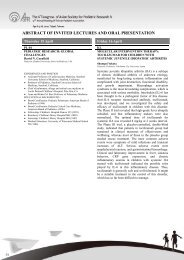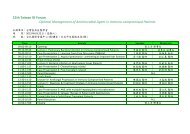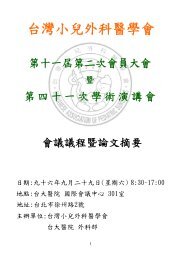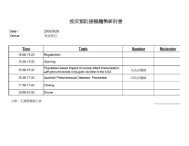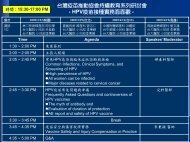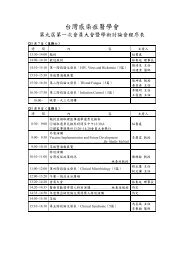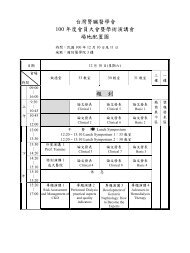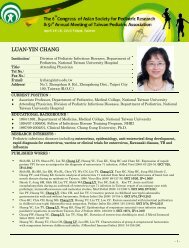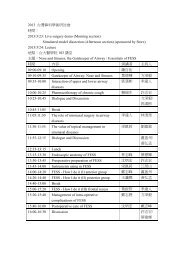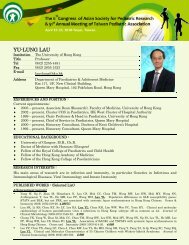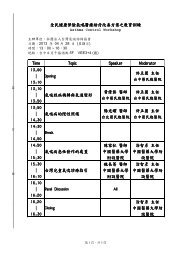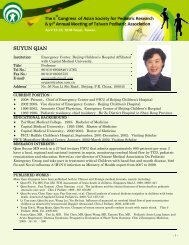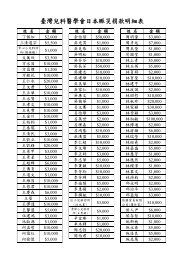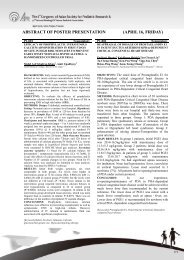ABSTRACT OF POSTER PRESENTATION (APRIL 17, SATURDAY)
ABSTRACT OF POSTER PRESENTATION (APRIL 17, SATURDAY)
ABSTRACT OF POSTER PRESENTATION (APRIL 17, SATURDAY)
Create successful ePaper yourself
Turn your PDF publications into a flip-book with our unique Google optimized e-Paper software.
P2-103 Gastroenterology P2-104 GastroenterologyZINC AND PROBIOTICSUPPLEMENTATION FOR PEDIATRICINPATIENTS WITH DIARRHEA IN ANINDONESIA DISTRICT GENERALOUTCOME <strong>OF</strong> AN INTERDISCIPLINARYFEEDING REHABILITATION PROGRAM FORCHILDREN WITH NEURODEVELOPMENTALDISABILITIESHOSPITALSiti Chasanah 1 , Ferri Widodo 2 , Diana Lyrawati 1,2 ,Nurcahyo Budi Santoso 31 Laboratory of Pharmacy, Faculty of Medicine, Brawijaya University –Saiful Anwar Hospital, Malang, Indonesia 2 Study Program of Pharmacy, Faculty of Medicine, Brawijaya University,Malang, Indonesia; 3 Department of Pediatrics, Division of Infection,Faculty of Medicine, Brawijaya University – Saiful Anwar Hospital,Malang, IndonesiaBACKGROUND: Zinc and probiotic supplementation(Zn-probiotic) has been shown to accelerate recoveryfrom diarrhea in children in many developing countries,yet their efficacy in children in Indonesia is uncertain.Despite the recommendation of WHO/UNICEF andMinistry of Health Republic of Indonesia for use of zinc,it remains excluded from list of drugs covered by nationalhealth insurance (Askes/SKTM/Jamkesmas).OBJECTIVE: This study aimed at evaluatingsupplementation of zinc-probiotic, to explore contributingfactor to non-adherence, regimen of therapy andassociated clinical outcomes in the management ofdiarrhea in pediatric inpatients.METHOD: A prospective observational study wasconducted in High Nursing Dependency Unit, one ofpediatric wards at Saiful Anwar Hospital, Malang,Indonesia. Data were collected from medical record anddirect observation of all patients with diarrheahospitalized during February to December 2009.RESULTS: From 41 patients, 60% (28 cases) wasprescribed for Zn and probiotic supplementation. Of thesepatients, adherence was observed in 59% patients;whereas the rest did not adhere to therapy due to palatableor difficulties in consuming the Zn formulated as tabletand financial resources of the patients. Supplementationof Zn-probiotics associated with recovery in 60% of thepatients compared to 40% in those who did not receiveZn-probiotic. Other than Zn and probiotic, in somepatients, antibiotics were also used concurrently. Ouranalysis showed that the use of antibiotics did notsignificantly influence time needed for recovery ofdiarrhea; in both groups with or without antibioticsdiarrhea lessen within 1-5 days.CONCLUSION: Our observation indicated thatprescription for supplementation of Zn-probiotic forchildren with diarrhea has reached 60% of the patients,and associated with higher proportion of patientsrecovered from diarrhea. Further studies are warrantedto validated these results to support recommendation ofZn-probiotic being included in the national scheme ofhealth insurance and adjustment of Zn dosage form toimprove adherence.[Keywords]zinc,probiotic,diarrhea,pediatric,high nursedependencyRosanna Ming Sum Wong, Sophelia ChanDepartment of Paediatrics and Adolescent MedicineDuchess of Kent Children’s Hospital and Queen Mary HospitalThe University of Hong Kong, Hong KongWe report the outcomes of an interdisciplinary program inHong Kong which was established in 2008 for themanagement of feeding difficulties in children withneurodevelopmental disabilities. The program was run bya feeding team which included developmentalpaediatrician and neurologist, gastroenterologist,paediatric surgeon, speech therapist, occupationaltherapist, dietitian and nurse specialist. This was a singlecentre longitudinal prospective cohort study designed toinvestigate the outcomes of the feeding rehabilitationprogram. Forty-nine patients were assessed and enrolledfrom March 2008 to March 2009. Thirty-one percent ofthe children had cerebral palsy and 27% hadchromosomal or syndromal disorders. Other diagnosesincluded prematurity, global developmental delay, brainmalformation, neuromuscular disease, traumatic braininjury and brain tumor. Outcome measures includedgrowth as measured by z score for body weight, change inmode of feeding and episodes of aspiration pneumoniarequiring medical attention. The patients were assessed atbaseline, 3-6 months and 6-12 months after intervention.Types of interventions included change in mode offeeding, oromotor therapy, treatment of gastro-esophagealreflux and dietary modification. Six patients hadgastrostomy +/- fundoplication performed and 5 patientswere weaned from nasogastric or orogastric tube feedingto full oral feeding during the period. Statisticalsignificant improvement in Z score for body weight anddecreased episodes of aspiration pneumonia wereobserved.305



